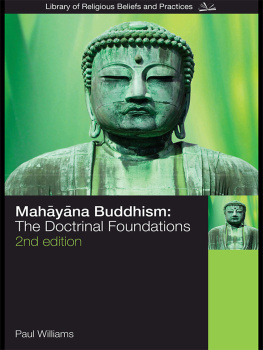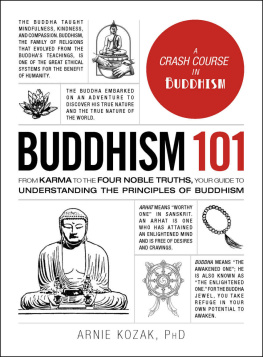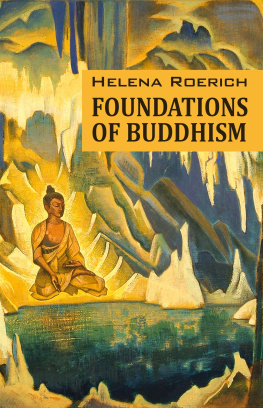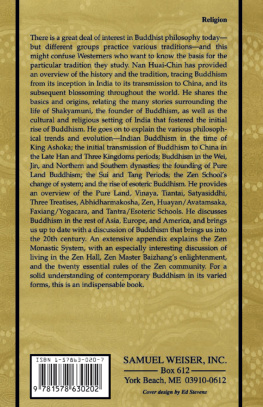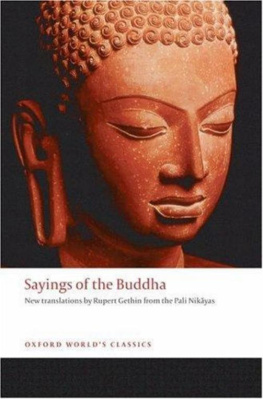Gethin - The Foundations of Buddhism
Here you can read online Gethin - The Foundations of Buddhism full text of the book (entire story) in english for free. Download pdf and epub, get meaning, cover and reviews about this ebook. year: 1998, publisher: OUP Oxford, genre: Religion. Description of the work, (preface) as well as reviews are available. Best literature library LitArk.com created for fans of good reading and offers a wide selection of genres:
Romance novel
Science fiction
Adventure
Detective
Science
History
Home and family
Prose
Art
Politics
Computer
Non-fiction
Religion
Business
Children
Humor
Choose a favorite category and find really read worthwhile books. Enjoy immersion in the world of imagination, feel the emotions of the characters or learn something new for yourself, make an fascinating discovery.

The Foundations of Buddhism: summary, description and annotation
We offer to read an annotation, description, summary or preface (depends on what the author of the book "The Foundations of Buddhism" wrote himself). If you haven't found the necessary information about the book — write in the comments, we will try to find it.
Gethin: author's other books
Who wrote The Foundations of Buddhism? Find out the surname, the name of the author of the book and a list of all author's works by series.
The Foundations of Buddhism — read online for free the complete book (whole text) full work
Below is the text of the book, divided by pages. System saving the place of the last page read, allows you to conveniently read the book "The Foundations of Buddhism" online for free, without having to search again every time where you left off. Put a bookmark, and you can go to the page where you finished reading at any time.
Font size:
Interval:
Bookmark:
An OPUS book
The Foundations of
Buddhism
Rupert Gethin is Lecturer in Indian Religions in the Department of Theology and Religious Studies, and co-director of the Centre for Buddhist Studies, at the University of Bristol. He is author of The Buddhist Path to Awakening (1992) and is a specialist in Theravda Buddhism.
OPUS General Editors
Christopher Butler
Robert Evans
John Skorupski
OPUS books provide concise, original, and authoritative introductions to a wide range of subjects in the humanities and social sciences. They are written by experts for the general reader as well as for students.
Rupert Gethin

Oxford University Press, Great Clarendon Street, Oxford 02 6DP
Oxford New York
Athens Auckland Bangkok Bogota Bombay
Buenos Aires Calcutta Cape Town Dar es Salaam
Delhi Florence Hong Kong Istanbul Karachi
Kuala Lumpur Madras Madrid Melbourne
Mexico City Nairobi Paris Singapore
Taipei Tokyo Toronto Warsaw
and associated companies in
Berlin Ibadan
Oxford is a trade mark of Oxford University Press
Rupert Gethin 1998
First published as an Oxford University Press paperback 1998
All rights reserved. No part of this publication may be reproduced,
stored in a retrieval system, or transmitted, in any form or by any means,
without the prior permission in writing of Oxford University Press.
Within the UK, exceptions are allowed in respect of any fair dealing for the
purpose of research or private study, or criticism or review, as permitted
under the Copyright, Designs and Patents Act, 1988, or in the case of
reprographic reproduction in accordance with the terms of the licences
issued by the Copyright Licensing Agency. Enquiries concerning
reproduction outside these terms and in other countries should be
sent to the Rights Department, Oxford University Press,
at the address above.
This book is sold subject to the condition that it shall not, by way
of trade or otherwise, be lent, re-sold, hired out or otherwise circulated
without the publishers prior consent in any form of binding or cover
other than that in which it is published and without a similar condition
including this condition being imposed on the subsequent purchaser
British Library Cataloguing in Publication Data
Data available
Library of Congress Cataloging in Publication Data
Gethin, Rupert.
The foundations of Buddhism / Rupert Gethin.
Includes index.
1. Buddhism. 1. Title
BQ4012.G47 1998 294.3dc21 9812246
ISBN 0192892231
5 7 9 1 0 8 6
Typeset by Graphicraft Typesetters Ltd., Hong Kong
Printed in Great Britain by Cox & Wyman Ltd, Reading, England
For my mother
My understanding of the Buddhist tradition owes much to many. Some of what is owed and to whom is apparent from the notes and bibliography of the present volume, but some deserve special mention. To Lance Cousins, who first introduced me to Buddhism, I owe a special debt. A number of people have read drafts of parts of this book during the course of its writing; to Lance Cousins, Hugh Gethin, Michael Houser, Rita Langer, Ken Robinson, Alexander von Rospatt, Oman Rotem, Gregory Schopen, and Paul Williams I am especially grateful for their comments, criticisms, and encouragement. I am also grateful to my students and all those others whose questions and puzzled faces have prompted me to try to express what I understand of Buddhism more clearly. Finally a word of thanks to my editor at OUP, George Miller, for his patience and help.
siddhir astu
ubham astu
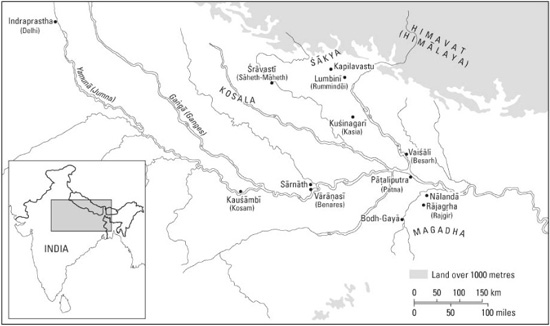
MAP I. The Ganges basin at the time of the Buddha
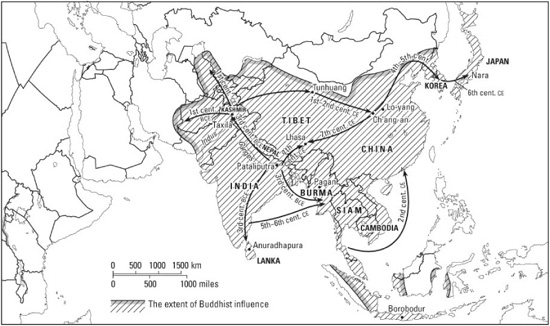
MAP 2. The spread of Buddhism in the ancient world
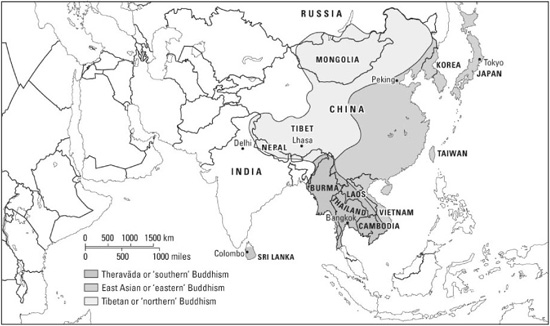
MAP 3. Buddhism in the modern world
The original language of Buddhist thought is problematic. It was not Sanskrit (Old Indo-Aryan) but a closely related Middle Indo-Aryan dialect similar to Pali, the canonical language of the Buddhism of Sri Lanka and South-East Asia. As Buddhism developed in ancient India it tended increasingly to speak the universal language of ancient Indian culture, Sanskrit. Subsequently Buddhist texts were translated into Chinese and Tibetan which became major Buddhist languages in their own right.
The general principle I have adopted is to quote universal Buddhist terms in both Sanskrit and (when there is a difference) Pali, placed in parentheses after the English translation so: aggregates (skandha/khandha). If the term is used again in the body of the text I have generally preferred the Sanskrit form, unless the context is exclusively that of Theravda Buddhism. Terms that are specific or characteristic of a particular Buddhist tradition are quoted in the appropriate language(s), either Pali or Sanskrit with, where appropriate, their Chinese or Tibetan, or occasionally their Japanese or Korean translation.
The transliteration of Indian languages follows the standard transliteration scheme (see A. L. Basham, The Wonder that Was India, 5068); Chinese is quoted according to the WadeGiles system, rather than Pin-Yin, Tibetan according to the Wylie system. Words that have become part of the English language (i.e. would be found in an English dictionary) are left unitalicized but the appropriate diacritical marks have been added, hence nirvna.
The term Buddhism refers to a vast and complex religious and philosophical tradition with a history that stretches over some 2,500 years, taking in, at one time or another, the greater part of Asia, from Afghanistan and parts of Persia in the west to Japan in the east, from the great islands of Sumatra and Java in the south to Mongolia and parts of southern Russia in the north. As one writer reminds us, over half the worlds population today lives in areas where Buddhism has at one time or another been the dominant religious influence.
1. The Theravda tradition of Sri Lanka and South-East Asia, also sometimes referred to as southern Buddhism. Its canonical scriptures are preserved in Pali, an ancient Indian language closely related to Sanskrit. The school exemplifies a certain conservatism. Relative to the other two traditions, it can be regarded as generally closer in doctrine and practice to ancient Buddhism as it existed in the early centuries BCE in India. Today it is the religious tradition followed by a population of over 100 million in Sri Lanka, Burma, Thailand, Cambodia, and Laos.
2. The East Asian tradition of China, Korea, Japan, and Vietnam, also sometimes referred to as eastern Buddhism. Its scriptures are preserved in Chinese and its general outlook is that of the Mahyna or Great Vehicle, a movement of ancient Indian Buddhist thought and practice that from about the beginning of the Christian era dubbed those who did not adopt its overall vision of Buddhismrepresented today by the Theravdafollowers of the Lesser Vehicle (
Next pageFont size:
Interval:
Bookmark:
Similar books «The Foundations of Buddhism»
Look at similar books to The Foundations of Buddhism. We have selected literature similar in name and meaning in the hope of providing readers with more options to find new, interesting, not yet read works.
Discussion, reviews of the book The Foundations of Buddhism and just readers' own opinions. Leave your comments, write what you think about the work, its meaning or the main characters. Specify what exactly you liked and what you didn't like, and why you think so.




